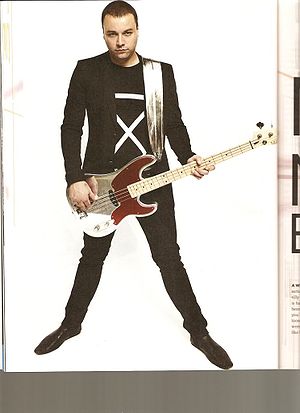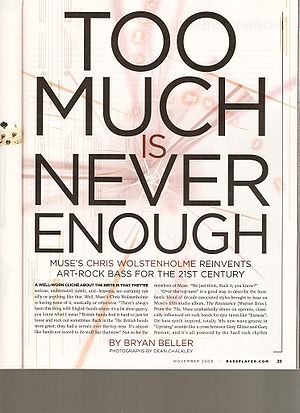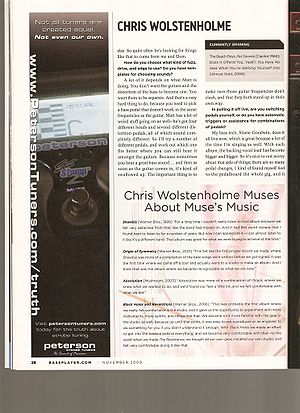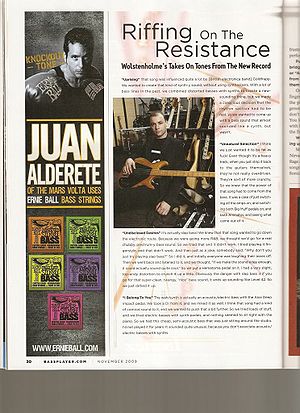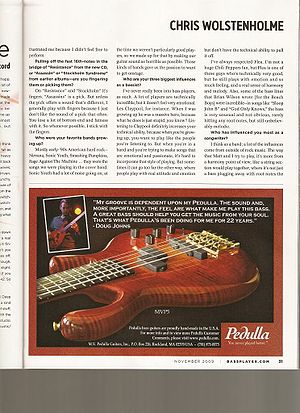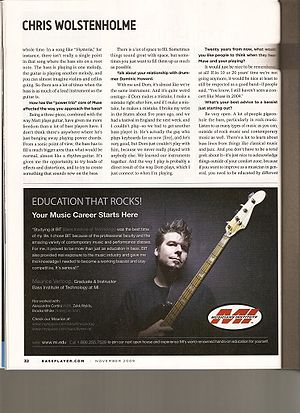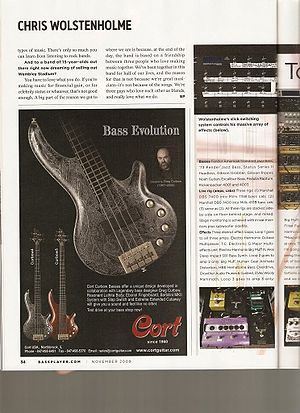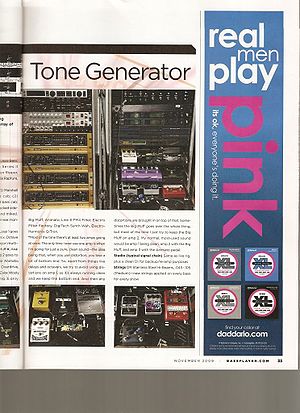Difference between revisions of "Bass Guitar Magazine 2009-10-04 – Too Much Is Never Enough"
(Add scan thumbnails; move link to thread; add to Category:Articles to be transcribed) |
(incomplete - coming back to it) |
||
| Line 10: | Line 10: | ||
[[File:Bass Guitar Magazine 2009-10-04 h.jpg | thumb | right | Page 35]] | [[File:Bass Guitar Magazine 2009-10-04 h.jpg | thumb | right | Page 35]] | ||
An interview with [[Christopher Wolstenholme]] in the November 2009 issue of Bass Guitar Magazine. | An interview with [[Christopher Wolstenholme]] in the November 2009 issue of Bass Guitar Magazine (Author - Bryan Beller). The text apparently skips around to different pages for who knows what reason. There are references as to what section to go to continue on with reading the desired section. | ||
==Muse's Chris Wolstenholme Reinvents Art-Rock Bass for the 21st Century (Page 25)== | |||
'''A well-worn cliché about the Brits is that they're''' serious, understated, subtle, and--heavens, no--certainly not silly or anything like that. Well, Muse's Chris Wolstenholme is having none of it, musically or otherwise. "There's always been this thing with English bands where it's a bit shoe-gaze-y, you know what I mean? British bands find it hard to just let loose and rock out sometimes. Back it the '70s, British bands were great; they had a certain over-the-top-ness. It's almost like bands are scared to do stuff like that now." Not so for the members of Muse: "We just think, Fuck it, you know?"<br> | |||
"Over-the-top-ness" is a good way to describe the bombastic blend of decade-associated styles brought to bear on Muse's fifth studio album, ''The Resistance'' [Warner Bros.]. From the '70s, Muse unabashedly draws on operatic, classically influenced art-rock bands for epic tunes like "Eurasia"; the bass-synth-inspired, totally '80s new wave groove in "Uprising" sounds like a cross between Gary Glitter and Gary Numan; and it's all powered by the hard rock rythm<br> | |||
(end of page 25 - cuts to page 28) | |||
==Chris Wolstenholme (Page 28 - Top)== | |||
So quite often he's looking for things like that to come from me and Dom.<br> | |||
===How do you choose what kind of fuzz, drive, and edge to use? Do you have templates for choosing sounds?=== | |||
A lot of it depends on what Matt is doing. You don't want the guitars and the distortion of the bass to become one. You want them to be separate. And that's a very hard thing to do, because you need to pick a bass pedal that doesn't work in the same frequencies as the guitar. Matt has a lot of weird stuff going on as well--he's got four different heads and several different distortion pedals, all of which sound completely different. So I'll try a number of different pedals, and work out which one fits better where you can still hear it amongst the guitars. Because sometimes you hear a great bass sound ... and then as soon as the guitar comes in, it's kind of swallowed up. The important thing is to make sure those guitar frequencies don't clash, and that they both stand up in their own way. | |||
===In pulling it off live, are you switching pedals yourself, or do you have automatic triggers or assistance for combinations of pedals?=== | |||
My bass tech, Shane Goodwin, does it all live now, which is great because a lot of the time I'm singing as well. With each album, the backing-vocal load has become bigger and bigger. So it's nice not to worry about that side of things; there are so many pedal changes, I kind of found myself tied to the pedalboard the whole gig, and it<br> | |||
(See "Chris Wolstenholme (Continued - Page 31)") | |||
==Chris Wolstenholme Muses About Muse's Music (Page 28 - Bottom)== | |||
'''''Showbiz''''' [Warner Bros., 1999] "For a long time I couldn't really listen to that album because we felt very detached from that, like the band had moved on. And it had this weird naiveté that I found hard to listen to for a number of years. But now I can appreciate it--I can almost listen to it like it's a different band. That album was good for what we were trying to achieve at the time."<br><br> | |||
'''''Origin of Symmetry''''' [Warner Bros., 2001] "This felt like the first proper record we made, where ''Showbiz'' was more of a compilation of songs we'd written before we got signed. It was the first time where we came off a tour and actually went to a studio to make an album. And I think that was the album where we became recognizable as what we are now."<br><br> | |||
'''''Absolution''''' [Mushroom, 2003] "Absolution was more of a continuation of ''Origin'', where we knew what we wanted to do, and we'd found our feet a little bit, and we felt comfortable with what we did."<br><br> | |||
'''''Black Holes and Revelations''''' [Warner Bros., 2006] "That was probably the first album where we really felt comfortable in the studio, and it gave us the opportunity to experiment with more instruments, more synths, and things like that. We became a lot more familiar with the gear in the studio as well, because up until that point, it was easy to ask a producer or an engineer to do something for you if you didn't understand it enough. With ''Black Holes'' we made an effort to get into the science behind everything, and we became very comfortable with that--to the point when we made ''The Resistance'', we bought all our own gear, installed our own studio, and felt very comfortable doing it like that. | |||
==Riffing on the Resistance (Page 30)== | |||
==Chris Wolstenholme (Continued - Page 31)== | |||
(See "Chris Wolstenholme (Continued - Page 32)") | |||
==Chris Wolstenholme (Continued - Page 32)== | |||
(See "Chris Wolstenholme (Continued - Page 34 - Top)") | |||
==Chris Wolstenholme (Continued - Page 34 - Top)== | |||
==Equipment (Pages 34-35)== | |||
== See also == | == See also == | ||
Revision as of 09:14, 3 April 2010
To cite this source, include <ref>{{cite/bassguitarmagazine20091004}}</ref>
An interview with Christopher Wolstenholme in the November 2009 issue of Bass Guitar Magazine (Author - Bryan Beller). The text apparently skips around to different pages for who knows what reason. There are references as to what section to go to continue on with reading the desired section.
Muse's Chris Wolstenholme Reinvents Art-Rock Bass for the 21st Century (Page 25)
A well-worn cliché about the Brits is that they're serious, understated, subtle, and--heavens, no--certainly not silly or anything like that. Well, Muse's Chris Wolstenholme is having none of it, musically or otherwise. "There's always been this thing with English bands where it's a bit shoe-gaze-y, you know what I mean? British bands find it hard to just let loose and rock out sometimes. Back it the '70s, British bands were great; they had a certain over-the-top-ness. It's almost like bands are scared to do stuff like that now." Not so for the members of Muse: "We just think, Fuck it, you know?"
"Over-the-top-ness" is a good way to describe the bombastic blend of decade-associated styles brought to bear on Muse's fifth studio album, The Resistance [Warner Bros.]. From the '70s, Muse unabashedly draws on operatic, classically influenced art-rock bands for epic tunes like "Eurasia"; the bass-synth-inspired, totally '80s new wave groove in "Uprising" sounds like a cross between Gary Glitter and Gary Numan; and it's all powered by the hard rock rythm
(end of page 25 - cuts to page 28)
Chris Wolstenholme (Page 28 - Top)
So quite often he's looking for things like that to come from me and Dom.
How do you choose what kind of fuzz, drive, and edge to use? Do you have templates for choosing sounds?
A lot of it depends on what Matt is doing. You don't want the guitars and the distortion of the bass to become one. You want them to be separate. And that's a very hard thing to do, because you need to pick a bass pedal that doesn't work in the same frequencies as the guitar. Matt has a lot of weird stuff going on as well--he's got four different heads and several different distortion pedals, all of which sound completely different. So I'll try a number of different pedals, and work out which one fits better where you can still hear it amongst the guitars. Because sometimes you hear a great bass sound ... and then as soon as the guitar comes in, it's kind of swallowed up. The important thing is to make sure those guitar frequencies don't clash, and that they both stand up in their own way.
In pulling it off live, are you switching pedals yourself, or do you have automatic triggers or assistance for combinations of pedals?
My bass tech, Shane Goodwin, does it all live now, which is great because a lot of the time I'm singing as well. With each album, the backing-vocal load has become bigger and bigger. So it's nice not to worry about that side of things; there are so many pedal changes, I kind of found myself tied to the pedalboard the whole gig, and it
(See "Chris Wolstenholme (Continued - Page 31)")
Chris Wolstenholme Muses About Muse's Music (Page 28 - Bottom)
Showbiz [Warner Bros., 1999] "For a long time I couldn't really listen to that album because we felt very detached from that, like the band had moved on. And it had this weird naiveté that I found hard to listen to for a number of years. But now I can appreciate it--I can almost listen to it like it's a different band. That album was good for what we were trying to achieve at the time."
Origin of Symmetry [Warner Bros., 2001] "This felt like the first proper record we made, where Showbiz was more of a compilation of songs we'd written before we got signed. It was the first time where we came off a tour and actually went to a studio to make an album. And I think that was the album where we became recognizable as what we are now."
Absolution [Mushroom, 2003] "Absolution was more of a continuation of Origin, where we knew what we wanted to do, and we'd found our feet a little bit, and we felt comfortable with what we did."
Black Holes and Revelations [Warner Bros., 2006] "That was probably the first album where we really felt comfortable in the studio, and it gave us the opportunity to experiment with more instruments, more synths, and things like that. We became a lot more familiar with the gear in the studio as well, because up until that point, it was easy to ask a producer or an engineer to do something for you if you didn't understand it enough. With Black Holes we made an effort to get into the science behind everything, and we became very comfortable with that--to the point when we made The Resistance, we bought all our own gear, installed our own studio, and felt very comfortable doing it like that.
Riffing on the Resistance (Page 30)
Chris Wolstenholme (Continued - Page 31)
(See "Chris Wolstenholme (Continued - Page 32)")
Chris Wolstenholme (Continued - Page 32)
(See "Chris Wolstenholme (Continued - Page 34 - Top)")
